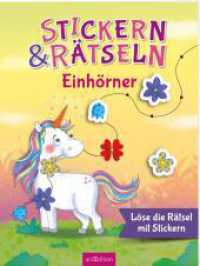- ホーム
- > 洋書
- > 英文書
- > Religion / Ethics
Full Description
This book is available in open access thanks to the generous support of the Adam Mickiewicz University, Poznań
Defining the Identity of the Younger Europe gathers studies that shed new light on the rich tapestry of early modern "Younger Europe" — Byzantine-Slavic and Scandinavian territories. It unearths the multi-dimensional aspects of the period, revealing the formation and transformation of nations that shared common threads, the establishment of political systems, and the enduring legacies of religious movements. Immersive, enlightening, and thought-provoking, the book promises to be an indispensable resource for anyone interested in the complexities of early modern
Europe. This collection does not just retell history; it provokes readers to rethink it.
Contributors: Giovanna Brogi, Piotr Chmiel,Karin Friedrich, Anna Grześkowiak-Krwawicz, Mirosława Hanusiewicz-Lavallee, Robert Aleksander Maryks, Tadhg Ó hAnnracháin, Maciej Ptaszyński, Paul Shore, and Frank E. Sysyn.
Contents
Contents
Notes on Editors and Contributors
Introduction
Mirosława Hanusiewicz-Lavallee and Robert A. Maryks
The Polish-Lithuanian Commonwealth and the Birth of Modern Ukraine: a Reappraisal of the Khmelnytsky "Revolution"
Frank E. Sysyn
Abstract
Keywords
1 National Traditions
2 Periodization
3 The General Crisis of the Seventeenth Century and Early Modern Revolts
4 The Religious Factor
5 New Research Agendas
6 Conclusion
The Younger Europe—or the Older? Visions of Politics in the Early Modern Polish-Lithuanian Commonwealth
Anna Grześkowiak-Krwawicz
Abstract
Keywords
1 On the Main Route: the Republican Tradition
2 The Side Path: Disregard of New Concepts
3 New Propositions: New Roads
The "Common Good" and Urban Crisis Management in Early Modern East-Central Europe: the Examples of Danzig and Slutsk
Karin Friedrich
Abstract
Keywords
1 Self-Interest versus "Common Good" in the "Younger Europe"
2 The "Common Good," Natural Law, and Hugo Grotius
3 Danzig's Conflict with Stefan Báthory
4 The "Well-Ordered Government" of the City of Slutsk
5 Conclusion
Good Editions of Unpublished Texts: the Case of Stefan Iavorskii
Giovanna Brogi
Abstract
Keywords
1 Historical and Cultural Context
2 Stefan Iavorskii's Heretige
3 Documentary and Cultural Significance
4 Stefan Iavorskii and Lazar Baranovych
5 Conclusion
Words Spoken and Unspoken: Preachers and the Baltic Reformation in the Younger Europe
Maciej Ptaszyński
Abstract
Keywords
1 Introduction
2 Early Reformation in the North
3 Stralsund on the Eve of Iconoclasm
4 Conclusion
The Younger Europe from a Papal Perspective, 1580-1640
Tadhg Ó hAnnracháin
Abstract
Keywords
1 Introduction: Catholic Geography of Europe
2 Perceptions of the Polish-Lithuanian Commonwealth
3 Conclusion
The Battle of Mohács, Re-remembered History, and Hungary's "Christian" Identity
Paul Shore†
Abstract
Keywords
Conclusion
Acknowledgements
Younger, but How? Heterochrony of Premodern European Divisions in the Discourse on Central/East-Central Europe
Piotr Chmiel
Abstract
Keywords
1 Introduction
2 East-West Divide
3 From Spatial to Temporal Divisions
4 Views on Europe: Time and Space
5 Reflections on Early Modern Times
6 Toward a Conclusion: Heterochrony, History, and the East-West Divide
Bibliography
Index








